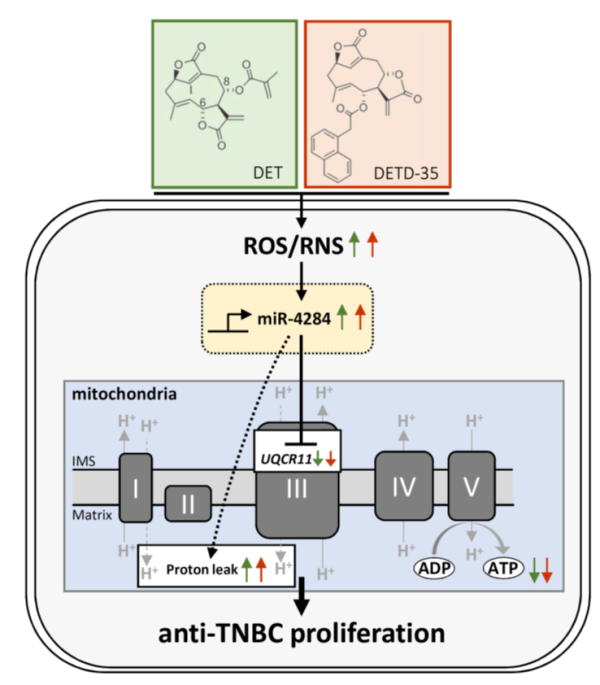miRNA-mediated mitochondrial dysfunction is involved in the anti-triple-negative breast cancer cell activity of phytosesquiterpene lactones.

Triple negative breast cancer (TNBC) is the most challenging breast cancer subtype to treat and lacks targeted therapies. Emerging evidence suggests that modulating redox homeostasis through targeting mitochondrial functions may be a useful strategy for suppressing triple-negative breast cancer (TNBC) activities. In this study, we identified oxidative stress-responsive differentially expressed miRNAs (DEMs) regulated by phytosesquiterpene lactone deoxyelephantopin (DET) and its novel derivative DETD-35, which are known to inhibit TNBC growth and metastasis in vitro and in vivo. Mitochondrial dysfunction was identified as a major biological function regulated by a few specific DEMs. In particular, miR-4284 was identified to play a role in DET- and DETD-35–mediated ROS production, mitochondrial basal proton leak and anti-proliferation activity in TNBC cells. Moreover, DET- and DETD-35–induced mitochondrial DNA damage was observed in TNBC cells and xenograft tumors. miR-4284 was also identified to play a role in oxidative DNA damage in TNBC tumors. This study reveals a novel role of miR-4284 in regulating mitochondrial activities in TNBC cells and tumors and highlight its direct correlation with TNBC patient survival. We also provide new insight into the therapeutic mechanisms of DET and DETD-35 in suppressing TNBC via redox-associated miRNAs.
Cheng, Y.-T., Nakagawa-Goto, K., Lee, K.-H., and Shyur, L.-F.* (2023) miRNA-mediated mitochondrial dysfunction is involved in the anti-triple-negative breast cancer cell activity of phytosesquiterpene lactones. Antioxidants & Redox Signaling, (DOI: 10.1089/ars.2021.0251)

